人教版(2019)必修 第二册Unit 3 The internet Reading for Writing课件(共22张PPT)
文档属性
| 名称 | 人教版(2019)必修 第二册Unit 3 The internet Reading for Writing课件(共22张PPT) | 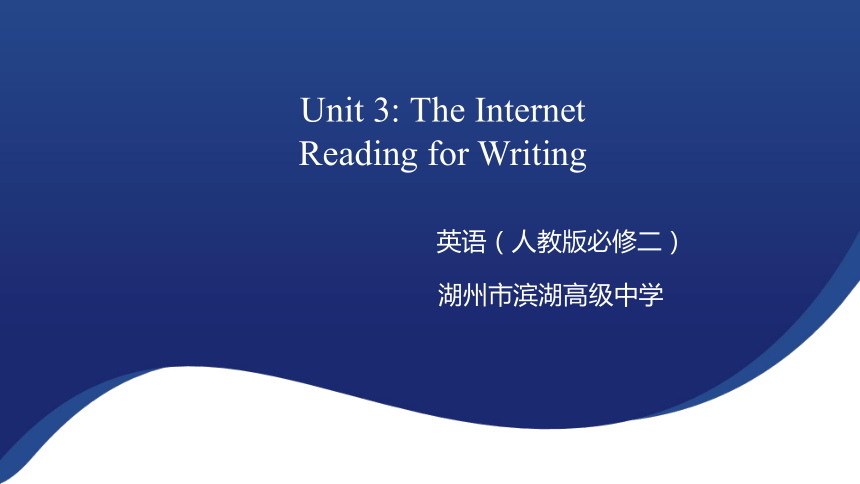 | |
| 格式 | pptx | ||
| 文件大小 | 3.0MB | ||
| 资源类型 | 教案 | ||
| 版本资源 | 人教版(2019) | ||
| 科目 | 英语 | ||
| 更新时间 | 2024-10-13 20:34:37 | ||
图片预览

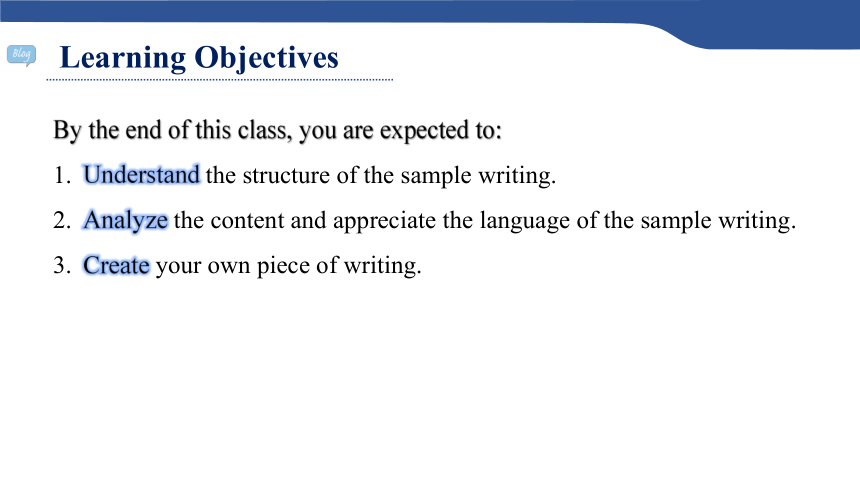
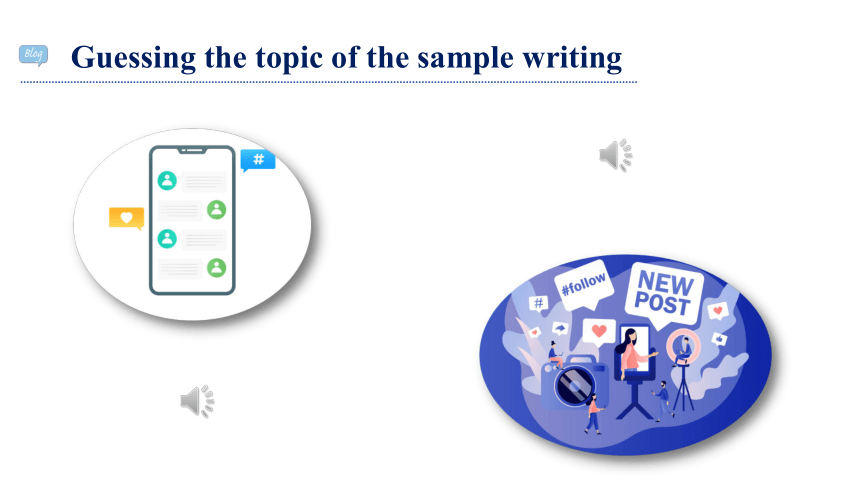
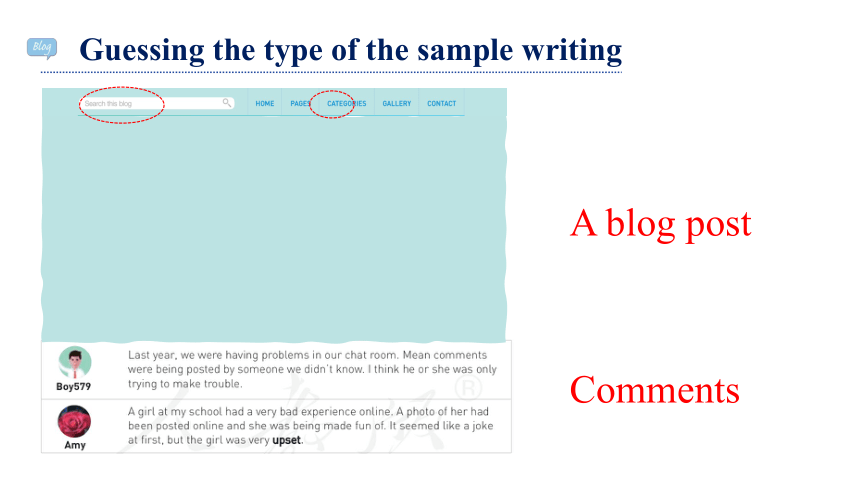
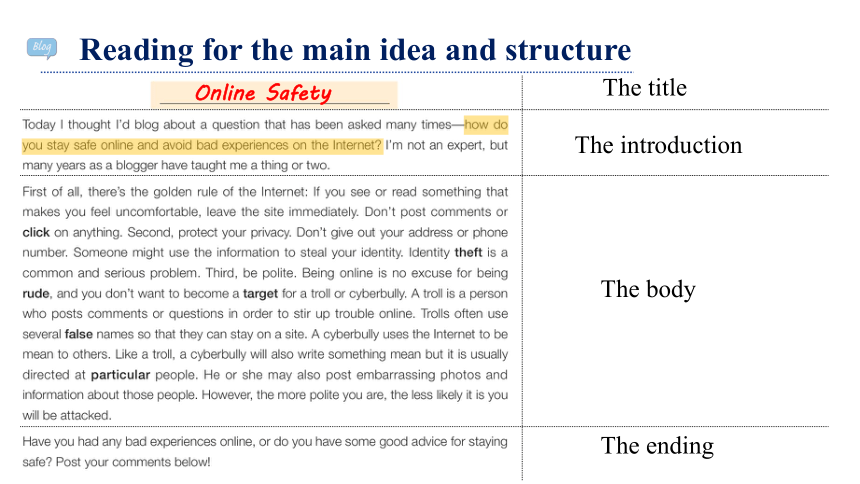
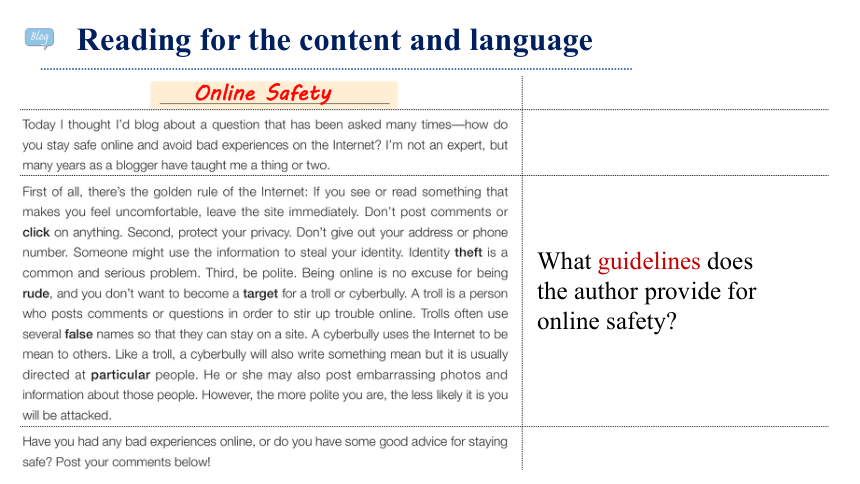
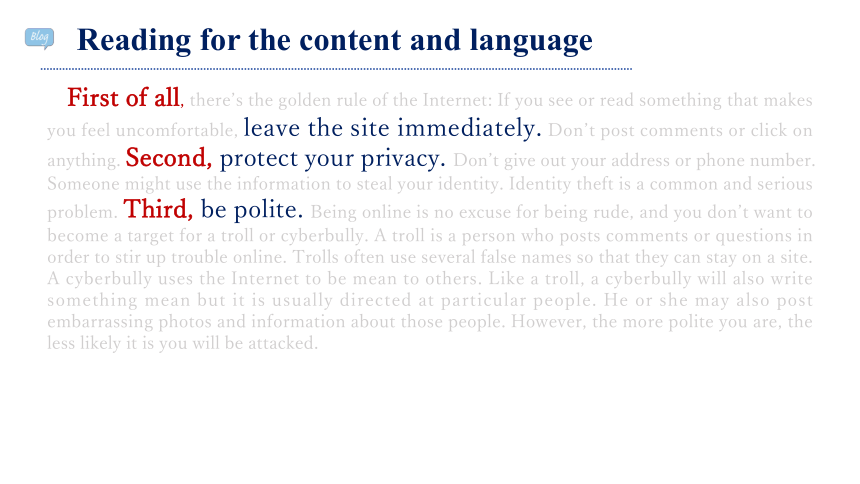
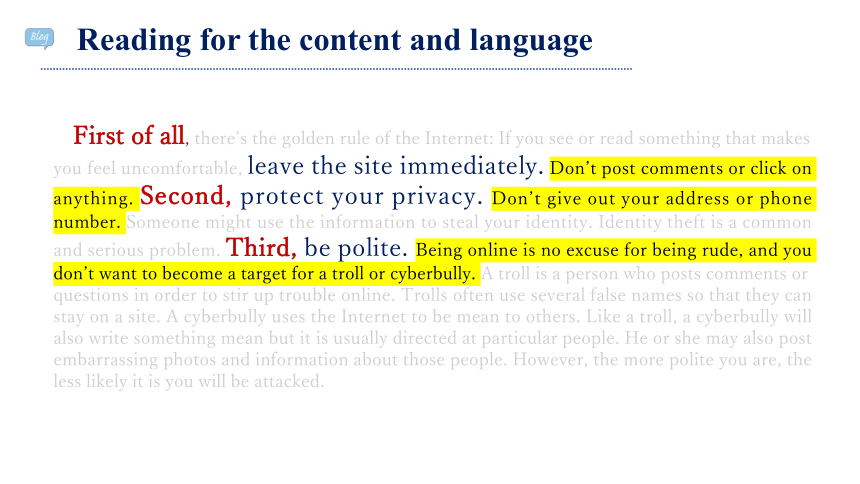
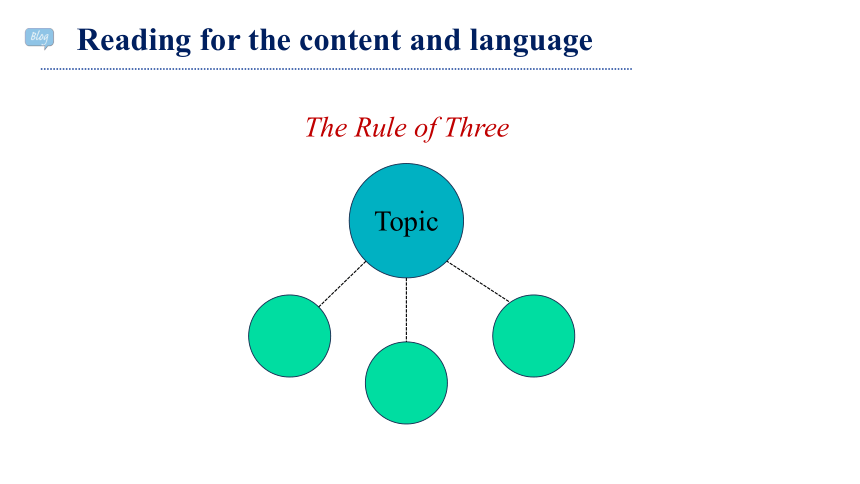
内容文字预览
(共22张PPT)
Unit 3: The Internet
Reading for Writing
湖州市滨湖高级中学
英语(人教版必修二)
Learning Objectives
By the end of this class, you are expected to:
Understand the structure of the sample writing.
Analyze the content and appreciate the language of the sample writing.
Create your own piece of writing.
Guessing the topic of the sample writing
Guessing the type of the sample writing
A blog post
Comments
Reading for the main idea and structure
The title
The introduction
The body
The ending
Online Safety
Reading for the content and language
Online Safety
What guidelines does the author provide for online safety
First of all, there’s the golden rule of the Internet: If you see or read something that makes you feel uncomfortable, leave the site immediately. Don’t post comments or click on anything. Second, protect your privacy. Don’t give out your address or phone number. Someone might use the information to steal your identity. Identity theft is a common and serious problem. Third, be polite. Being online is no excuse for being rude, and you don’t want to become a target for a troll or cyberbully. A troll is a person who posts comments or questions in order to stir up trouble online. Trolls often use several false names so that they can stay on a site. A cyberbully uses the Internet to be mean to others. Like a troll, a cyberbully will also write something mean but it is usually directed at particular people. He or she may also post embarrassing photos and information about those people. However, the more polite you are, the less likely it is you will be attacked.
Reading for the content and language
First of all, there’s the golden rule of the Internet: If you see or read something that makes you feel uncomfortable, leave the site immediately. Don’t post comments or click on anything. Second, protect your privacy. Don’t give out your address or phone number. Someone might use the information to steal your identity. Identity theft is a common and serious problem. Third, be polite. Being online is no excuse for being rude, and you don’t want to become a target for a troll or cyberbully. A troll is a person who posts comments or questions in order to stir up trouble online. Trolls often use several false names so that they can stay on a site. A cyberbully uses the Internet to be mean to others. Like a troll, a cyberbully will also write something mean but it is usually directed at particular people. He or she may also post embarrassing photos and information about those people. However, the more polite you are, the less likely it is you will be attacked.
Reading for the content and language
The Rule of Three
Topic
Reading for the content and language
Topic
Reading for the content and language
First of all, there’s the golden rule of the Internet: If you see or read something that makes you feel uncomfortable, leave the site immediately. Don’t post comments or click on anything. Second, protect your privacy. Don’t give out your address or phone number. Someone might use the information to steal your identity. Identity theft is a common and serious problem. Third, be polite. Being online is no excuse for being rude, and you don’t want to become a target for a troll or cyberbully. A troll is a person who posts comments or questions in order to stir up trouble online. Trolls often use several false names so that they can stay on a site. A cyberbully uses the Internet to be mean to others. Like a troll, a cyberbully will also write something mean but it is usually directed at particular people. He or she may also post embarrassing photos and information about those people. However, the more polite you are, the less likely it is you will be attacked.
How are the new words explained
Reading for the content and language
Someone might use the information to steal your identity. Identity theft is a common and serious problem. Third, be polite. Being online is no excuse for being rude, and you don’t want to become a target for a troll or cyberbully. A troll is a person who posts comments or questions in order to stir up trouble online. Trolls often use several false names so that they can stay on a site. A cyberbully uses the Internet to be mean to others. Like a troll, a cyberbully will also write something mean but it is usually directed at particular people. He or she may also post embarrassing photos and information about those people. However, the more polite you are, the less likely it is you will be attacked.
An illustrative example is presented to explain who is an “identity theft”.
Reading for the content and language
A troll is a person who posts comments or questions in order to stir up trouble online. Trolls often use several false names so that they can stay on a site. A cyberbully uses the Internet to be mean to others. Like a troll, a cyberbully will also write something mean but it is usually directed at particular people. He or she may also post embarrassing photos and information about those people. However, the more polite you are, the less likely it is you will be attacked.
Simple words and an explanatory sentence are used to define “troll”.
Reading for the content and language
A troll is a person who posts comments or questions in order to stir up trouble online. Trolls often use several false names so that they can stay on a site. A cyberbully uses the Internet to be mean to others. Like a troll, a cyberbully will also write something mean but it is usually directed at particular people. He or she may also post embarrassing photos and information about those people. However, the more polite you are, the less likely it is you will be attacked.
“Cyberbully” is defined by comparing it with “troll”.
Reading for the content and language
Have you had any bad experiences online, or do you have some good advice for staying safe Post your comments below!
How does the author end the blog post
By asking for comments.
Reading for the content and language
To engage with readers.
Why does the author ask for comments
wildlife
loss
protect
Install anti-virus software to protect your computer.
Use complex passwords instead of simple ones and change them regularly.
Avoid using unsafe Wi-Fi connection in public places.
Don’t click on links popping out of nowhere on a website.
Q: Can you think of other ways to stay safe online
Brainstorming for writing
Drafting
Introduction Tell your readers about yourself and what you know about the topic. Friendly tone
Frank attitude
Body Tell your readers what they should do or keep in mind. Define new words or key terms. Well-organized (the rule of three)
Persuasive
(Explaining/Defining/Comparing)
Ending Ending by asking the readers to write comments. Open attitude
Structure
Content
Language
In-class writing
Choose one of the following topics and use the notes to create your blog post.
Use a website you are familiar with.
Use strong passwords.
Don’t use public computers.
...
Don’t post personal information.
Don’t believe everything you read.
Be polite.
…
Don’t give out too much information.
Never meet someone you met online alone.
…
Online shopping sites
Social networking apps
Online chat rooms
Using the checklist and giving feedback
Does the writer tell the reader what he/she knows about the topic
Are all the tips and suggestions well-organized
Has the writer defined the new words
Does the author include examples, comparisons, or explanations
Does the writer end by asking readers to leave comments and suggestions
Can you find any grammatical or spelling mistakes
A possible version for reference
Does the writer tell the reader what he/she knows about the topic
Are all the tips and suggestions well-organized
Has the writer defined the new words
Does the author include examples, comparisons, or explanations
Does the writer end by asking readers to leave comments and suggestions
Can you find any grammatical or spelling mistakes
Assignments
Polish your blog post based on your peer’s evaluation.
Post your blog post in your social media account and invite your friends to leave their comments.
Thank You!
Unit 3: The Internet
Reading for Writing
湖州市滨湖高级中学
英语(人教版必修二)
Learning Objectives
By the end of this class, you are expected to:
Understand the structure of the sample writing.
Analyze the content and appreciate the language of the sample writing.
Create your own piece of writing.
Guessing the topic of the sample writing
Guessing the type of the sample writing
A blog post
Comments
Reading for the main idea and structure
The title
The introduction
The body
The ending
Online Safety
Reading for the content and language
Online Safety
What guidelines does the author provide for online safety
First of all, there’s the golden rule of the Internet: If you see or read something that makes you feel uncomfortable, leave the site immediately. Don’t post comments or click on anything. Second, protect your privacy. Don’t give out your address or phone number. Someone might use the information to steal your identity. Identity theft is a common and serious problem. Third, be polite. Being online is no excuse for being rude, and you don’t want to become a target for a troll or cyberbully. A troll is a person who posts comments or questions in order to stir up trouble online. Trolls often use several false names so that they can stay on a site. A cyberbully uses the Internet to be mean to others. Like a troll, a cyberbully will also write something mean but it is usually directed at particular people. He or she may also post embarrassing photos and information about those people. However, the more polite you are, the less likely it is you will be attacked.
Reading for the content and language
First of all, there’s the golden rule of the Internet: If you see or read something that makes you feel uncomfortable, leave the site immediately. Don’t post comments or click on anything. Second, protect your privacy. Don’t give out your address or phone number. Someone might use the information to steal your identity. Identity theft is a common and serious problem. Third, be polite. Being online is no excuse for being rude, and you don’t want to become a target for a troll or cyberbully. A troll is a person who posts comments or questions in order to stir up trouble online. Trolls often use several false names so that they can stay on a site. A cyberbully uses the Internet to be mean to others. Like a troll, a cyberbully will also write something mean but it is usually directed at particular people. He or she may also post embarrassing photos and information about those people. However, the more polite you are, the less likely it is you will be attacked.
Reading for the content and language
The Rule of Three
Topic
Reading for the content and language
Topic
Reading for the content and language
First of all, there’s the golden rule of the Internet: If you see or read something that makes you feel uncomfortable, leave the site immediately. Don’t post comments or click on anything. Second, protect your privacy. Don’t give out your address or phone number. Someone might use the information to steal your identity. Identity theft is a common and serious problem. Third, be polite. Being online is no excuse for being rude, and you don’t want to become a target for a troll or cyberbully. A troll is a person who posts comments or questions in order to stir up trouble online. Trolls often use several false names so that they can stay on a site. A cyberbully uses the Internet to be mean to others. Like a troll, a cyberbully will also write something mean but it is usually directed at particular people. He or she may also post embarrassing photos and information about those people. However, the more polite you are, the less likely it is you will be attacked.
How are the new words explained
Reading for the content and language
Someone might use the information to steal your identity. Identity theft is a common and serious problem. Third, be polite. Being online is no excuse for being rude, and you don’t want to become a target for a troll or cyberbully. A troll is a person who posts comments or questions in order to stir up trouble online. Trolls often use several false names so that they can stay on a site. A cyberbully uses the Internet to be mean to others. Like a troll, a cyberbully will also write something mean but it is usually directed at particular people. He or she may also post embarrassing photos and information about those people. However, the more polite you are, the less likely it is you will be attacked.
An illustrative example is presented to explain who is an “identity theft”.
Reading for the content and language
A troll is a person who posts comments or questions in order to stir up trouble online. Trolls often use several false names so that they can stay on a site. A cyberbully uses the Internet to be mean to others. Like a troll, a cyberbully will also write something mean but it is usually directed at particular people. He or she may also post embarrassing photos and information about those people. However, the more polite you are, the less likely it is you will be attacked.
Simple words and an explanatory sentence are used to define “troll”.
Reading for the content and language
A troll is a person who posts comments or questions in order to stir up trouble online. Trolls often use several false names so that they can stay on a site. A cyberbully uses the Internet to be mean to others. Like a troll, a cyberbully will also write something mean but it is usually directed at particular people. He or she may also post embarrassing photos and information about those people. However, the more polite you are, the less likely it is you will be attacked.
“Cyberbully” is defined by comparing it with “troll”.
Reading for the content and language
Have you had any bad experiences online, or do you have some good advice for staying safe Post your comments below!
How does the author end the blog post
By asking for comments.
Reading for the content and language
To engage with readers.
Why does the author ask for comments
wildlife
loss
protect
Install anti-virus software to protect your computer.
Use complex passwords instead of simple ones and change them regularly.
Avoid using unsafe Wi-Fi connection in public places.
Don’t click on links popping out of nowhere on a website.
Q: Can you think of other ways to stay safe online
Brainstorming for writing
Drafting
Introduction Tell your readers about yourself and what you know about the topic. Friendly tone
Frank attitude
Body Tell your readers what they should do or keep in mind. Define new words or key terms. Well-organized (the rule of three)
Persuasive
(Explaining/Defining/Comparing)
Ending Ending by asking the readers to write comments. Open attitude
Structure
Content
Language
In-class writing
Choose one of the following topics and use the notes to create your blog post.
Use a website you are familiar with.
Use strong passwords.
Don’t use public computers.
...
Don’t post personal information.
Don’t believe everything you read.
Be polite.
…
Don’t give out too much information.
Never meet someone you met online alone.
…
Online shopping sites
Social networking apps
Online chat rooms
Using the checklist and giving feedback
Does the writer tell the reader what he/she knows about the topic
Are all the tips and suggestions well-organized
Has the writer defined the new words
Does the author include examples, comparisons, or explanations
Does the writer end by asking readers to leave comments and suggestions
Can you find any grammatical or spelling mistakes
A possible version for reference
Does the writer tell the reader what he/she knows about the topic
Are all the tips and suggestions well-organized
Has the writer defined the new words
Does the author include examples, comparisons, or explanations
Does the writer end by asking readers to leave comments and suggestions
Can you find any grammatical or spelling mistakes
Assignments
Polish your blog post based on your peer’s evaluation.
Post your blog post in your social media account and invite your friends to leave their comments.
Thank You!
